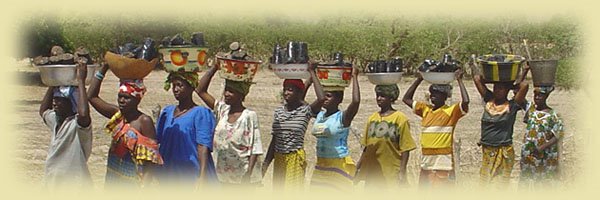The Bottomless Oil Well
 If the village of Garalo and the work of Mali-Folkcenter Nyetaa are a sign of things to come for rural Africa, the future is bright. My latest journey to this rural village in the south of Mali began when I was asked to accompany a Dutch engineer, Sander, and a masters student (Inge) because they were in need of an interpretor. They were leaving the next day for what became a 6 day trip; this is what I have come to expect while working here... Plan A's don't really serve a purpose.
If the village of Garalo and the work of Mali-Folkcenter Nyetaa are a sign of things to come for rural Africa, the future is bright. My latest journey to this rural village in the south of Mali began when I was asked to accompany a Dutch engineer, Sander, and a masters student (Inge) because they were in need of an interpretor. They were leaving the next day for what became a 6 day trip; this is what I have come to expect while working here... Plan A's don't really serve a purpose.
There is no doubt in my mind that MFC Nyetaa and the villagers of Garalo are going down in the record books. The electric current in Garalo was generated for the first time from vegetable oil in what has become the largest bio-fuel electrification project in Africa. The 125 Kva generator – one of three at the power plant – that feeds electricity into over 170 homes gives light, refrigeration and security to about 4,700 people. And I was there to witness it.
And I was there to witness it.
The scale of this project is overwhelming when you walk around the village at night or see the sheer size of the generator running. Through my role as an interpretor, I was lucky enough to better understand the mechanics of both, even down to specific details like the piston pressure adjustments required to switch to bio-fuel. This was mostly thanks to Sander, the engineer who installed the generator sets last May. He began working on ships at the age of 17 as an apprentice until he became chief engineer a decade or so later. Having now started his own company, Brodtech, he has installed generator sets not only in Mali but also Tanzania, with many more on the horizon and has done so at one third of the price other companies had quoted because, as he told me, he just wants enough money to put bread on the table.
Two of my days were spent accompanying Inge while she surveyed about 35 households, mainly through the family chiefs. Her research looks into consumer use of energy in terms of appliances currently used and potential ones in the future to determine how much the grid could handle. Most interviews were done through a translation train starting from english, to french, to bambara and back the other way again. After that experience, I've realized that a message is initially so fragile when being transmitted through a roller-coaster of interpretation. The ride gets even bumpier when the message is only understood by engineers or mechanics, both of which I certainly am not. The interviews gave me a much better understanding of the villagers' opinion of this newfound access to electricity. Some people, mostly the less fortunate living off their land, found the monthly fee of 6,500 CFA Francs (about 14$ cdn) too much for their budgets. They were collectively asking to change from a monthly fee system to a meter-based system where you pay for what you consume.
The interviews gave me a much better understanding of the villagers' opinion of this newfound access to electricity. Some people, mostly the less fortunate living off their land, found the monthly fee of 6,500 CFA Francs (about 14$ cdn) too much for their budgets. They were collectively asking to change from a monthly fee system to a meter-based system where you pay for what you consume.
If only it were that easy...
In order for this whole project to be sustainable, it was decided that a private company (ACCESS) founded by the Mali-Folkecenter Nyetaa would be responsible for the operation of the power plant. Currently, ACCESS barely makes any profit, only enough to continue growing. They have explained to their customers that as the number of total subscribers increases, they will be provided with longer hours of operation (it's currently 5 hours every night but they are about 20 new customers away from being able to offer 6 or 7 hours nightly) and perhaps be able to switch to a meter-based system. Without having to delve back too far into my managerial economics courses (I still get shivers when I hear someone say "marginal cost"), the simple explanation is that there is a base cost (fuel, salaries,etc) that ACCESS needs to cover and this meter-based system, combined with an insufficient base of subcsribers, would cause immediate losses. This is where the debate of economic development to eradicate poverty begins... but I will leave it there because it's one where I am sitting on the fence.
This is where the debate of economic development to eradicate poverty begins... but I will leave it there because it's one where I am sitting on the fence.
Jatropha crops are growing and people will soon be able to sell them in exchange for some extra income that could potentially go towards paying these seemingly pricey electricity bills. One villager described jatropha as being their bottomless oil well. If this cycle does become sustainable, the future looks bright in terms of access to electricity for rural Mali and perhaps all of rural Africa.
I'd like to end this post by welcoming "Monsieur P" as a contributor to this blog. If his next posts are as humourous and insightful as his first, we are in for a real treat.


No comments:
Post a Comment